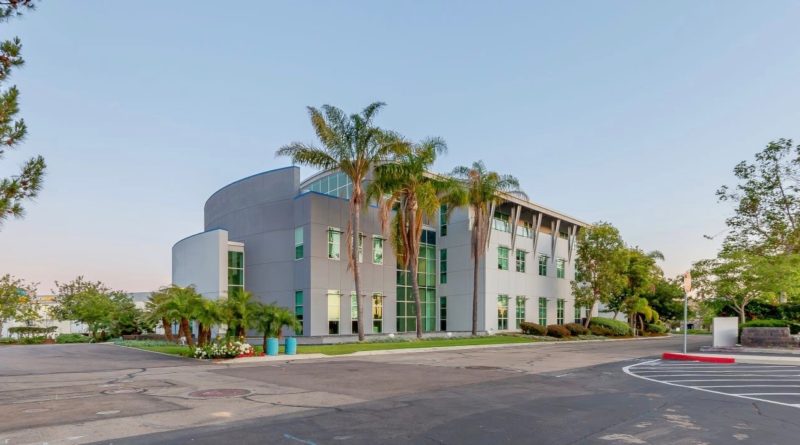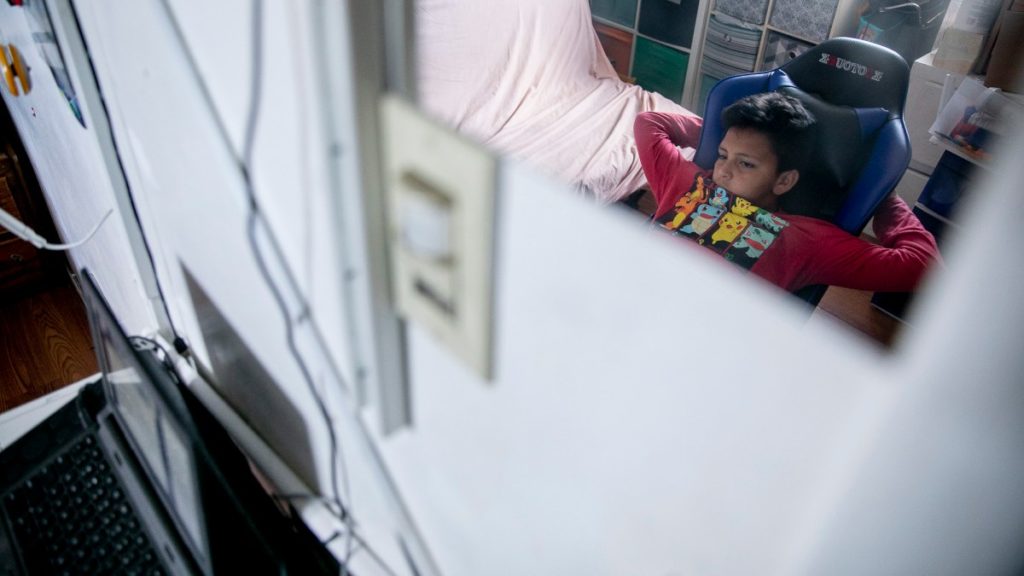Daily Business Report-April 30, 2021
Health care group acquires office building to
convert to surgery center and medical offices
NextMed – San Diego Owner LLC has paid $8.95 million for the Class A, three-story 36,073-square-foot building located at 5643 Copley Drive in San Diego. NextMed anchored by a surgery center developer and a group of doctors, will convert the building to a surgery center and medical offices.
“Growth in the San Diego health care real estate market has been strong for several years, which has remained the case even through the challenges of the COVID pandemic,” said Chris Ross, executive vice president at JLL Healthcare Practice Group.
Chris Ross, Paul Braun and Kelly Moriarty of JLL’s Healthcare Practice Group in San Diego represented NextMed San Diego Owner LLC. The seller, Manchester Financial, was represented by Derek Hulse, Morgan Reno and Duncan Dodd of Cushman Wakefield.
PHOTO: Office building at 5643 Copley Drive to be converted to surgery center and medical offices.
Workforce agency receives $1.5 million grant
to increase employment in cybersecurity careers
The San Diego-based workforce agency received a two-year grant of $1.5 million from The James Irvine Foundation to fund CyberHire San Diego—a movement that aims to increase the number of unemployed, underemployed and low-wage workers in quality cybersecurity careers. CyberHire will help San Diegans launch a meaningful cyber career that will help them support themselves, their families and our shared community.
Enrollment for the program is expected to begin in the fall with the grant in place through 2023. The $1.5 million grant will fund industry certification exam fees, intensive certification test preparation for participants and Workforce Partnership staff for the areas of program management and oversight of direct service delivery to job seeker customers in the target audience.
Analysis shows why millions of California
students lack broadband
CalMatters
Though schools have scrambled to deliver laptops, tablets and hotspots to students, and promoted low-income Internet plans offered by telecom companies like AT&T and Comcast, one in five California households with K–12 students told the Census Bureau in late March they don’t always have the internet access needed for virtual school. Interviews with over 30 students, teachers, researchers, advocates and education leaders revealed that hotspots and discount broadband are often unreliable, leading to a year of education disrupted by screen freezes, distorted audio, and getting booted out of Zoom classes.
The COVID-19 pandemic brought California’s digital divide out of the shadows and to the forefront of public policy. Families sued school systems and the state for failing to provide poor, Black and Latino students equal access to high quality education online. Education leaders argued that logging on at home will be part of a 21st century K-12 education. Lawmakers are now calling Internet access a basic civil right.
“We need to envision being able to provide affordable, reliable internet for all like we provide water and electricity,” said Assemblymember Al Muratsuchi, a Democrat from Torrance, during a recent webinar about closing the broadband divide.
SANDAG awarded $12.1 million to complete
gap in Inland Rail Trail
SANDAG was awarded nearly $12.1 million in Active Transportation Program (ATP) grant funds from the California Transportation Commission for the completion of the seven-mile “San Marcos to Vista” segment of the Inland Rail Trail.
The funds will support the completion of a critical two-mile gap of the Inland Rail Trail in the City of Vista, between Civic Center Drive and North Drive. When the project is complete, the result will be 14 continuous miles of the Inland Rail Trail between Escondido and eastern Oceanside that will provide an opportunity for people to safely bike and walk, and will advance efforts to reduce greenhouse gas emissions in the San Diego region.
Realtors organization May 6 program
focuses on risk management issues
The Pacific Southwest Association of Realtors (PSAR), one of the county’s largest real estate trade groups, will host a meeting over the Zoom for San Diego-area brokers and office managers on risk management issues from 11 a.m. to 1 p.m., Thursday, May 6.
The meeting is the latest in ongoing discussions with local brokerage leaders discussing common transactional issues and creating solutions. Additional topics to be discussed will include the pending settlement between the National Association of Realtors (NAR) and the U.S. Department of Justice that involves informing consumers about commission totals paid to brokers.
Meeting facilitator will be Nikki Coppa, PSAR Realtor, broker and chair of the NAR Risk Management Committee. Guest speaker will be Jason Parson, supervising special investigator, California Department of Real Estate.
For meeting information, visit www.psar.org or call (619) 421-7811.
Water Authority says ratepayers saved
$48 million in bond refunding
The San Diego County Water Authority this month completed a series of bond refundings that will save ratepayers $48 million – the latest in a long series of debt refinancing moves that help reduce the cost of critical water infrastructure investments, the agency reported.
The savings from the refinancing of Series 2021S-1 (Green Bonds) and Series 2021B (Green Bonds) were supported by continued strong credit ratings issued in March. Green bonds are designated to encourage sustainability and to support clean water, sustainable water management and other environmental projects.
Water Authority court victories recently generated $44.4 million in refunds for member agencies and prevented tens of millions of dollars in additional charges. In addition, the Water Authority has rescheduled capital projects, deferred equipment replacement, and left several staff positions vacant to reduce overhead while maintaining supply reliability.
How SARS-CoV-2 hijacks human cells to evade immune system
Researchers at University of California San Diego School of Medicine have discovered one way in which SARS-CoV-2, the coronavirus that causes COVID-19, hijacks human cell machinery to blunt the immune response, allowing it to establish infection, replicate and cause disease.
In short, the virus’ genome gets tagged with a special marker by a human enzyme that tells the immune system to stand down, while at the same time ramping up production of the surface proteins that SARS-CoV-2 uses as a “doorknob” to enter cells.
The study, published April 22, 2021 in Cell Reports, helps lay the groundwork for new anti-viral immunotherapies — treatments that work by boosting a patient’s immune system, rather than directly killing the virus.
Building a voice assistant for older adults.
Computer scientists at the University of California San Diego received an Amazon Research Award to develop a voice assistant to better communicate with older adults. Their initial goal is to create a system capable of understanding and answering the medical questions of adults over age 65.
The way the elderly sometimes struggle to use voice assistants like Alexa or Siri may often be joked about, but the problem is real: data show that adults over 65—a demographic expected to double between 2010 and 2050—tend to give up on using these tools after several unsuccessful attempts at getting their questions answered.




